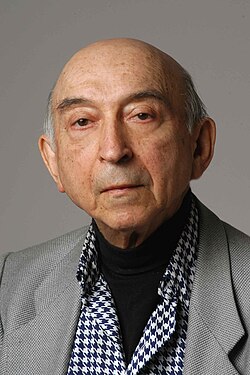Lotfi Zadeh
Lotfi Zadeh (født 4. februar 1921 i Baku i sovjetrepublikken Aserbajdsjan i Sovjetunionen, død 6. september 2017 i Berkeley i California i USA[22][23]) var en informatiker og matematiker med forskning innen blant annet datamaskiner og kunstig intelligens, og som er kjent for å ha lansert tesen om fuzzylogikk.
| Lotfi Zadeh Lütfəli Rəhimoğlu Əsgərzadə (Lotfi Aliaskerzadeh) | |||
|---|---|---|---|
 | |||
| Født | 4. feb. 1921[1][2] Novkhany (Baku Uyezd, Den aserbajdsjanske sosialistiske sovjetrepublikk)[3] Baku[4] | ||
| Død | 6. sep. 2017[5][6] Berkeley (California, USA) | ||
| Beskjeftigelse | Matematiker, ingeniør, professor, informatiker, universitetslærer | ||
| Utdannet ved | Massachusetts Institute of Technology Columbia School of Engineering and Applied Science Universitetet i Teheran Columbia University[7] | ||
| Doktorgrads- veileder | John R. Ragazzini | ||
| Barn | Norm Zada | ||
| Nasjonalitet | Aserbajdsjan USA Iran | ||
| Gravlagt | Æresalleen | ||
| Medlem av | Det polske vitenskapsakademi[8] National Academy of Engineering Association for Computing Machinery (1994–) (ACM Fellow)[9] | ||
| Utmerkelser | 20 oppføringer
Guggenheim-stipendiet[10]
IEEE James H. Mulligan, Jr. Education Medal (1973)[11] Benjamin Franklin-medaljen (2009) IEEEs æresmedalje (1995)[12] ACM - AAAI Allen Newell Award (2000) Eringen Medal (1976)[13] IEEE Richard W. Hamming Medal (1992)[14] Richard E. Bellman Control Heritage Award (1998)[15] Dostlug Order Nizami Ganjavi Gold Medal BBVA Foundation Frontiers of Knowledge Award (2012) Honorary doctorate of the University of Oviedo (1995)[16] ACM Fellow (1994)[9] IEEE Fellow Honorary doctorate of the University of Granada (1996)[17] Rufus Oldenburger Medal (1993)[18] AAAI Fellow (1991)[19] Kampé de Fériet Award Okawa Prize (1996)[20] Æresdoktor ved Université Pierre-et-Marie-Curie (2001)[21] | ||
Etter den andre verdenskrig har han vært knyttet til Massachusetts Institute of Technology og Columbia University. I 1959 ble han professor ved Universitetet i California i Berkeley. Den første artikkelen om Fuzzy Sets publiserte han i 1965.
Bibliografi (utvalg)
rediger- 1965: Fuzzy sets. Information and Control; 8: 338–353.
- 1965: «Fuzzy sets and systems» i: Fox J, red.: System Theory. Brooklyn, NY: Polytechnic Press: 29–39.
- 1972: «A fuzzy-set-theoretical interpretation of linguistic hedges» i: Journal of Cybernetics; 2: 4–34.
- 1973: «Outline of a new approach to the analysis of complex systems and decision processes» i: IEEE Trans. Systems, Man and Cybernetics; 3: 28–44.
- 1974: «Fuzzy logic and its application to approximate reasoning» i: Information Processing 74, Proc. IFIP Congr. (3), s. 591–594.
- 1975: «Fuzzy logic and approximate reasoning» i: Synthese; 30: 407–428.
- 1975: «Calculus of fuzzy restrictions» i: Zadeh LA, Fu KS, Tanaka K, Shimura M, red.: Fuzzy Sets and their Applications to Cognitive and Decision Processes. New York: Academic Press, s. 1–39.
- 1975: «The concept of a linguistic variable and its application to approximate reasoning», I–III, i: Information Sciences 8, 199–251, 301–357; 9, 43–80.
- 2002: «From computing with numbers to computing with words — from manipulation of measurements to manipulation of perceptions» i: International Journal of Applied Math and Computer Science 12 (3), s. 307–324,
- 2012: Computing With Words. Principal Concepts and Ideas. Berlin: Springer
Referanser
rediger- ^ «Lotfi Zadeh, Father of Mathematical ‘Fuzzy Logic,’ Dies at 96»[Hentet fra Wikidata]
- ^ Understanding Fuzzy Logic: An Interview with Lotf i Zadeh [DSP History], ieeexplore.ieee.org[Hentet fra Wikidata]
- ^ «Lütfi Zadə dünyaya nələr bəxş etdi...»[Hentet fra Wikidata]
- ^ Tsjekkias nasjonale autoritetsdatabase, NKC-identifikator stk2008441993, besøkt 8. februar 2024[Hentet fra Wikidata]
- ^ University of California, Berkeley, «Lotfi Zadeh has passed away», utgitt 6. september 2017[Hentet fra Wikidata]
- ^ Solomon R. Guggenheim Museum, oppført som Lotfi A. Zadeh, Guggenheim fellows ID lotfi-a-zadeh, besøkt 9. oktober 2017[Hentet fra Wikidata]
- ^ Mathematics Genealogy Project[Hentet fra Wikidata]
- ^ czlonkowie.pan.pl, besøkt 26. mars 2019[Hentet fra Wikidata]
- ^ a b awards.acm.org, besøkt 23. juni 2024[Hentet fra Wikidata]
- ^ Guggenheim Fellows database, Guggenheim fellows ID lotfi-a-zadeh[Hentet fra Wikidata]
- ^ www.ieee.org[Hentet fra Wikidata]
- ^ www.ieee.org[Hentet fra Wikidata]
- ^ socengsci.org[Hentet fra Wikidata]
- ^ www.ieee.org[Hentet fra Wikidata]
- ^ a2c2.org[Hentet fra Wikidata]
- ^ secretaria.uniovi.es[Hentet fra Wikidata]
- ^ archivo.ugr.es[Hentet fra Wikidata]
- ^ www.asme.org[Hentet fra Wikidata]
- ^ aaai.org[Hentet fra Wikidata]
- ^ www.okawa-foundation.or.jp[Hentet fra Wikidata]
- ^ Journal officiel de la République française, legifrance.gouv.fr[Hentet fra Wikidata]
- ^ https://elpais.com/elpais/2017/09/07/ciencia/1504794144_525637.html
- ^ «News». EECS at UC Berkeley. Besøkt 8. september 2017.
Eksterne lenker
rediger- (Våren 1998): Lotfi Zadeh, Berkeley Commencement Speech: «Commercialism and Human Values: When You Can't Stop for Lunch» i Azerbaijan International, 6 (1), . 65.
- (Vinter 1999): «Famous People: Then and Now, Lotfi Zadeh» (refleksjon over hans barndom) i Azerbaijan International, 7 (4), s. 28-29.
- (Vinter 1994): «Lotfi Zadeh: Short Biographical Sketch» i: Azerbaijan International, 2 (4), s. 49.
Denne artikkelen er en spire. Du kan hjelpe Wikipedia ved å utvide den.